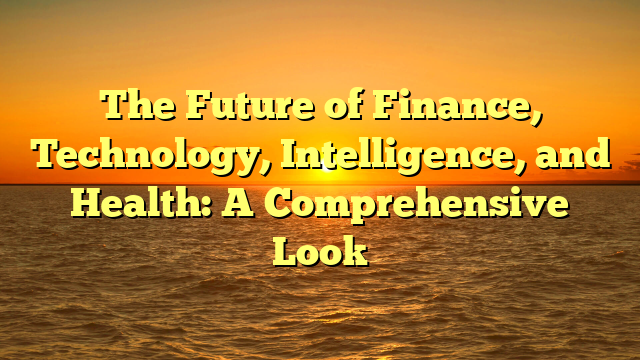Introduction: The modern world is undergoing rapid changes driven by advancements in finance, technology, artificial intelligence, and health. These four fields are not only reshaping industries but also impacting our daily lives in profound ways. In this article, we will examine the evolving relationship between these sectors and how they are converging to define the future.
Finance and Technology: Advancements in technology have significantly impacted the financial industry. The rise of fintech, distributed ledger technology, and AI has led to the creation of more efficient, secure, and innovative financial systems. This has revolutionized everything from everyday banking to investment strategies, allowing individuals and businesses to access financial services with greater ease and speed.
Artificial intelligence is transforming the financial industry by enabling predictive analytics, real-time risk management, and more accurate fraud detection. By leveraging Emas168 and powerful algorithms, AI enhances decision-making capabilities and reduces human error. Furthermore, the implementation of blockchain technology in finance offers decentralized systems that improve transparency and security.
Intelligence and Technology: Artificial intelligence (AI) and machine learning (ML) are playing a critical role in transforming industries. In healthcare, AI technologies are making a significant impact by improving diagnostic accuracy, personalizing treatments, and enhancing patient care. Machine learning algorithms enable healthcare professionals to analyze complex medical data, predict patient outcomes, and create customized treatment plans tailored to individual needs.
In the financial sector, AI-driven technologies are enabling automated trading, portfolio management, and fraud detection. With the ability to analyze vast amounts of financial data, AI systems can provide insights and predictions that assist in optimizing investment strategies and minimizing risks. These technologies are also improving efficiency in managing investments and identifying potential fraud.
Health and Technology: The integration of digital health solutions into healthcare is transforming the way we manage our well-being. Wearable devices, telemedicine, and health apps are providing people with new ways to monitor their health and engage in preventive care. With real-time health tracking, individuals can make informed decisions about their lifestyle choices and detect health issues early, promoting better outcomes and overall wellness.
Artificial intelligence is making significant strides in the healthcare industry, particularly in drug development and personalized treatment plans. By analyzing patient data, AI systems can predict treatment effectiveness and recommend tailored therapies. This technological breakthrough is leading to faster drug discovery and more precise treatments, which can ultimately improve patient outcomes while reducing healthcare costs.
Conclusion: As we look toward the future, the integration of financial technology, intelligence, digital health, and medicine will continue to create new opportunities for innovation and improvement. While challenges remain, particularly around data security, ethical considerations, and regulatory frameworks, the potential for these fields to work together to enhance our quality of life is immense. By embracing these advancements, we can create a more connected, efficient, and healthier world.
